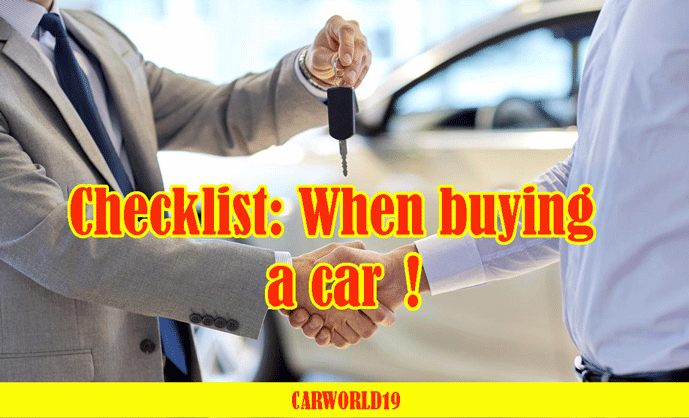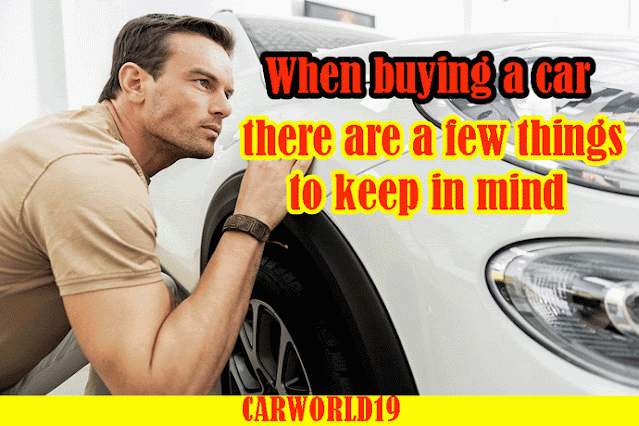Purchasing a car is a major choice. It's one of the most costly things we buy.
However, with so many chances and possible problems, it's difficult to know where to start. Especially if you aren't a licensed mechanic.
 |
| Checklist: When buying a car! |
DEALERS VS. PRIVATE ENTRIES
First and foremost, you must pick where you will purchase your vehicle. The majority of customers choose a dealership since it is secure and easy.
Consumer rights and warranties must be provided by car dealers to safeguard you if something goes wrong. They may also help you with paperwork, auto financing, and part-exchange of your previous vehicle.
Some customers are enticed by reduced pricing to acquire a car from a private seller. However, be aware that the dangers are substantially higher.
Privately purchased vehicles are "sold as seen" and must be "as described." This means it's up to you to notice any problems with the automobile, and you won't be protected legally if you buy a lemon.
BRAND NEW OR USED
The next decision to make is whether you want a new or used vehicle. This is due to a combination of personal taste and budgetary reasons. However, here are some alternatives:
- New automobiles are more costly and lose value faster than used ones. They do, however, come with a guarantee and the ability to customize the car's characteristics.
- Used automobiles are less expensive to purchase and hold their worth better. They are, however, more likely to require repairs and sometimes come with little or no guarantee.
- Approved Used is another option. These vehicles are sold by dealerships that have been certified by the manufacturers. The cars are thoroughly inspected and come with a guarantee to ensure your safety.
SUITABILITY
The sort of driving you do is one of the most significant aspects to consider when purchasing a vehicle.
For example, city driving necessitates smaller automobiles or electric vehicles with low emissions, but country routes necessitate larger SUVs.
Begin by determining what the automobile will be utilized for the majority of the time. Then follow this checklist to ensure if it is appropriate for your lifestyle.
- Is it designed to withstand your typical driving conditions and journeys?
- Is it the appropriate size? Is there enough room for the whole family and their belongings, or is it too tiny for parking in the city?
- Is it simple to get in and out, especially with three doors in the back seats?
- Is it possible to fold the back seats flat?
Any more features that are crucial to you can be included.
 |
| Checklist: When buying a car! |
FINANCE AND OPERATING COSTS
Many people just consider a car's purchase price, but it's also crucial to consider its ongoing expenditures. Consider all potential costs, including depreciation.
- Price of purchase
- Finance costs include:
- payment every month
- deposit
- charges for interest
- the last balloon payment
- a cost for relocating early or a mileage surcharge
- What is the car's insurance group and how much does it cost?
- Coverage for a breakdown
- Repairs, as well as service and MOT
- Band of road taxes
- Depreciation - look at the market value for vehicles of various ages and mileage.
- What's covered under warranty and what's not
- Monthly cost and fuel efficiency
A Hybrid or Electric vehicle may be the automobile for you if lower pollutants and lower fuel costs are essential considerations. Find out more about the advantages of going electric here.
DIESEL OR PETROL (OR HYBRID)
The type of motor gasoline you require is determined by the sort of driving you're to undertake.
- If you usually drive in cities, short distances, and at modest speeds, gasoline automobiles are the best option.
- Diesel vehicles are superior for long trips at high speeds, particularly on highways.
- Hybrid vehicles are good for city driving and short routes with many stops and starts.
- For relatively short commutes, electric automobiles are another alternative, especially if your town or office offers to charge facilities.
Learn more about the brands pioneering the electric revolution, from quick charging to the first carbon-neutral vehicle.
ADD-ONS
Check to see whether the automobile has any additional amenities you require.
- Is there a roof rack, a tow-bar, or a bike rack? Is it possible to include these?
- What are the different trim and style options?
- What safety measures and driver aid systems are included as standard and optional?
- Is there a cup holder on it?
 |
| Checklist: When buying a car! |
WHERE TO LOOK FOR THINGS TO LOOK FOR WHEN BUYING A USED CAR
Before you acquire a used automobile, be sure it's in good shape and that you know how it was previously operated. Details of repair work may be found in the service and MOT records.
Remember that before selling a used automobile, the dealer should check it and perform any required repairs. And Approved Used must pass rigorous checks.
What else should you check for in a secondhand car?
- Examine the vehicle for scratches and dents in dry weather.
- Are the tires uniformly worn?
- Will they have to be replaced soon?
- Is there a spare tire in the car, and is it in decent condition?
- Is the spare tire equipped with the necessary tools? Some automobile tires feature odd locking wheel nuts that require unique equipment to remove.
- Look for evidence of damage beneath the hood and on the floor mats.
- Is the upholstery in decent shape?
ELECTRICS
Make sure that all the electrics are operating as well.
- Air conditioning, heaters, fans, and windshield wipers are all available options.
- Interior lights, brake lights, and headlights
- Front and rear electric windows, as well as a heated rear windshield
- Seats that are heated
- Check the locks and inquire about the number of keys. Is there a spare or master key?
- Check any parking sensors and cameras
Don't overlook any qualms you may have regarding used autos. A vehicle is a significant investment that should feel correct.
Hopefully, this checklist will assist you in locating the ideal vehicle for you. Also, have a look at our list of things to watch for during a test drive.
